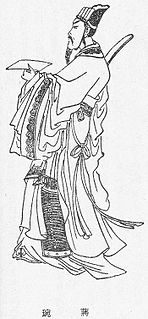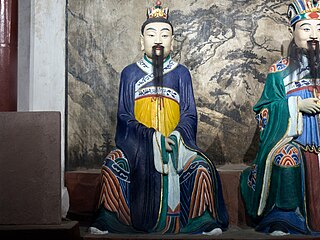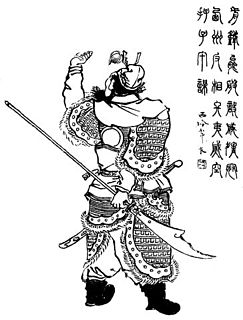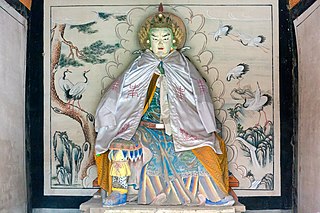 W
WChen Zhen, courtesy name Xiaoqi, was an official of the state of Shu Han in the Three Kingdoms period of China. When Liu Bei became Governor of Jing Province, Chen Zhen was hired to serve as a local officer and was stationed in various commanderies. When Liu Bei entered Yi Province, Chen Zhen remained in his service, where he progressed in rank and soon became Prefect of the Masters of Writing at the capital. When Sun Quan declared himself emperor and established the state of Eastern Wu in 229, Liu Shan sent Chen Zhen to offer his congratulations and to form an alliance, which he did, and they also drew out their respective states' boundaries.
 W
WDong He, courtesy name Youzai, was an official and minister of the state of Shu Han during the Three Kingdoms period of China. He originally served as Administrator of Yizhou under Liu Zhang, but surrendered to Liu Bei during Liu Bei's takeover of Yi Province. Dong He became a military supervisor, along with Zhuge Liang and was one of Liu Bei most important civil officers. He died seven years later in 221. Although it cost him his position under Liu Zhang, Dong He would not renounce his fair treatment, just rule and plain living. For those qualities, Dong He was admired and trusted by Han civilians and foreigners alike. His son, Dong Yun would inherited most of his characteristics and become one of the "Four Heroes".
 W
WFa Zheng (176–220), courtesy name Xiaozhi, was a key adviser to the warlord Liu Bei in the late Eastern Han dynasty. Born in a family of high social status and of noble descent, Fa Zheng travelled to Yi Province in the late 190s and became a subordinate of Liu Zhang, the provincial governor. However, his feelings of alienation and perception of Liu Zhang as an incompetent governor eventually led him to betray Liu Zhang and defect to Liu Bei in 211. Between 211 and 214, Fa Zheng assisted Liu Bei in overcoming Liu Zhang and seizing control of Yi Province, and became one of Liu Bei's most trusted advisers. In 217, he urged Liu Bei to launch the Hanzhong Campaign to capture the strategic Hanzhong Commandery from a rival warlord, Cao Cao, but died a year after Liu emerged victorious in the campaign.
 W
WJian Yong, courtesy name Xianhe, was a Chinese politician serving under the warlord Liu Bei in the late Eastern Han dynasty of China. He started working under Liu Bei since the very beginning of Liu Bei's career; he originally served as his lord's personal secretary and later as a messenger, minister or emissary for his lord. He was also known for being persuasive and broad-minded and for his carefree personality. Along with Mi Zhu, Sun Qian, and later Yi Ji, Jian's ideas were widely circulated in Liu's territories, which featured Confucius values and Han loyalist arguments, he greatly helped Liu Bei's image gaining creditably to the later's populist movement. Jian is thought to have died shortly after 214.
 W
WJiang Wan, courtesy name Gongyan, was a regent and military general of the state of Shu during the Three Kingdoms period of China. Born in the late Eastern Han dynasty, Jiang Wan initially served as a scribe, county chief and county prefect under the warlord Liu Bei, who later became the founding emperor of Shu. After Liu Bei's son Liu Shan succeeded his father as emperor in 223, Jiang Wan gradually rose to prominence under the regency of Zhuge Liang, the Imperial Chancellor of Shu. Between 228 and 234, while Zhuge Liang was away leading Shu forces on the Northern Expeditions against Shu's rival state Wei, Jiang Wan took charge of internal affairs and provided logistical support to the Shu forces at the frontline. After Zhuge Liang's death in 234, Jiang Wan succeeded him as regent and did well in gaining the Shu people's confidence and leading them into a post-Zhuge Liang era. During this time, he considered that the land-based route through the Qin Mountains used by Zhuge Liang during the Northern Expeditions was too difficult for navigation and transportation of supplies. He thus came up with a plan to switch to a water-based route along the Han River targeting Wei territories in present-day southern Shaanxi and northwestern Hubei. However, the Shu government rejected his plan as they thought it was too risky. In 243, due to poor health, Jiang Wan relocated from Hanzhong near the Wei–Shu border to Fu County. Towards the final years of his regency, as his health worsened, Jiang Wan gradually relinquished his powers to his deputies Fei Yi and Dong Yun but he continued to rule as regent in name. He died in 246 and was succeeded by Fei Yi.
 W
WMa Liang (187–222), courtesy name Jichang, was an official serving under the warlord Liu Bei during the late Eastern Han dynasty of China. Since he was young, Ma Liang was famous for his exceptional talent, with Chen Shou describing him as one of Shu's best officials; however, he was killed in battle at the age of 35 years during the Battle of Xiaoting. He was the elder brother of Ma Su and served in the state of Shu Han as one of the founding emperor Liu Bei's Palace Attendants during the early Three Kingdoms period.
 W
WMa Su (190–228), courtesy name Youchang, was a military general and strategist of the state of Shu Han in the Three Kingdoms period of China. Ma Su had conspicuous talent in military theories and was admired by the Shu chancellor Zhuge Liang. However, a tactical blunder by Ma Su at the Battle of Jieting resulted in Shu being dealt a huge defeat by Zhang He, a general of the rival state of Wei. He was a younger brother of Ma Liang.
 W
WMi Zhu, courtesy name Zizhong, was a Chinese military general and politician who served under the warlord Liu Bei in the late Eastern Han dynasty, during the Three Kingdoms period, after Liu Bei founded the state of Shu Han. He was also Liu Bei's brother-in-law, as his sister, Lady Mi, married Liu Bei. Mi Zhu was essential to Liu Bei during the defeats of the latter, financing Liu Bei's army in critical times where there was no tax base. Mi Zhu was extremely well educated and helped Liu Bei develop relationships with wealthy rivals such as Yuan Shao, Yuan Shu and Liu Biao. He was also the elder brother of Mi Fang, who served Liu Bei as well until his defection to Liu Bei's ally-turned-rival Sun Quan in 220. Mi Zhu served Liu Bei loyally for more than 25 years, as a high civil official of Liu during all the later's tenures as governor of Xu, Jing and Yi provinces, the former's ideas were regularly and widely circulated to the common people which greatly helped Liu Bei's political movement as Han loyalist and Confucian but, historians would argue it mere rhetoric as Liu ruled more in the tradition of legalism. Nonetheless, Mi along with Jian Yong, Sun Qian, and later Yi Ji, greatly contributed to the Liu's populist movement to restore the Han dynasty through literature and essays. Mi Zhu was thought to be Liu's best friend and most favored subject, he died of illness a little over a year after Liu Bei declared himself emperor.
 W
WPang Tong (179–214), courtesy name Shiyuan, was a Chinese politician. He was an adviser to the warlord Liu Bei in the late Eastern Han dynasty of China. In his youth, Pang Tong was disregarded because he was plain looking, however Sima Hui highly esteemed him calling him "the crown of learned men in Jing Province". He studied under him along with Zhuge Liang, Xu Shu and Xiang Lang and was given the nickname of "Fledgling Phoenix". Because of his friendly attitude, he worked as an appraiser in Nan Commandery. When reviewing someone, he would prioritize their virtue over their abilities and would encourage them to help others.
 W
WQin Mi, courtesy name Zichi, was an official of the state of Shu Han during the Three Kingdoms period of China.
 W
WSun Qian, courtesy name Gongyou, was a Chinese diplomat, military general, and official serving under the warlord Liu Bei in the late Eastern Han dynasty of China. His talent was noted by the scholar Zheng Xuan. So Liu Bei gave Sun Qian a position on his staff after he took Xu. Along with Jian Yong and Mi Zhu, Sun Qian frequently served as an ambassador for Liu Bei, most notably to Yuan Shao and Liu Biao. After Liu Bei took Yi Province, Sun Qian was promoted and held a rank equal to Jian Yong.
 W
WWei Yan, courtesy name Wenchang, was a military general of the state of Shu Han during the Three Kingdoms period of China. Originally a subordinate of the warlord Liu Bei in the late Eastern Han dynasty, Wei Yan rose through the ranks and became a general when Liu Bei seized control of Yi Province in 214. His performance in battle helped him to become a prominent figure in the Shu military in a short period of time. He was later appointed as the Administrator of Hanzhong Commandery and as an Area Commander in 219. Between 228 and 234, he participated actively in the Northern Expeditions led by the Shu regent Zhuge Liang against Shu's rival state, Cao Wei. After Zhuge Liang's death in 234, Wei Yan was killed by another Shu general, Ma Dai, for alleged treason.
 W
WYang Yi, courtesy name Weigong, was an official of the state of Shu Han in the Three Kingdoms period of China.
 W
WZhang Fei, courtesy name Yide, was a Chinese military general and politician serving under the warlord Liu Bei in the late Eastern Han dynasty and early Three Kingdoms period of China. Zhang Fei and Guan Yu, who were among the earliest to join Liu Bei, shared a brotherly relationship with their lord and accompanied him on most of his early exploits. Zhang Fei fought in various battles on Liu Bei's side, including the Red Cliffs campaign (208–209), takeover of Yi Province (212–214), and Hanzhong Campaign (217–218). He was assassinated by his subordinates in 221 after serving for only a few months in the state of Shu Han, which was founded by Liu Bei earlier that year.
 W
WZhang Ni, courtesy name Boqi, rendered also as Zhang Yi, was a military general of the state of Shu Han during the Three Kingdoms period of China. Famous for his courage and generosity, Zhang Ni made his name known while rescuing a magistrate's wife from bandits and leading her to safety.
 W
WZhang Yi, courtesy name Bogong, was a military general of the state of Shu Han during the Three Kingdoms period of China. Born in the late Eastern Han dynasty, Zhang Yi was a 10th-generation descendant of Zhang Liang. He started his career as a scribe under the warlord Liu Bei, who founded Shu later, and gradually rose to the positions of a county prefect and commandery administrator. In the early 230s, he served as an area commander tasked with maintaining the peace in Shu's southern commanderies. In 234, he led the Shu vanguard during the Battle of Wuzhang Plains against Shu's rival state Wei. From 238 to 259, Zhang Yi steadily rose through the ranks to become one of Shu's top generals. During this time, although he strongly opposed the Shu general Jiang Wei's aggressive stance towards Wei, he still accompanied Jiang Wei on his military campaigns against Wei. In 263, he surrendered to Wei forces along with the Shu emperor Liu Shan when Wei launched a large-scale invasion of Shu. In the following year, Zhang Yi was killed by mutineers during a rebellion by the Wei general Zhong Hui. Like Liao Hua and Zong Yu, Zhang was one of few officials who served the Shu-Han state throughout its entire existence.
 W
WZhuge Liang, courtesy name Kongming, was a Chinese statesman and military strategist. He was chancellor and later regent of the state of Shu Han during the Three Kingdoms period. He is recognised as the most accomplished strategist of his era, and has been compared to Sun Tzu, the author of The Art of War. His reputation as an intelligent and learned scholar grew even while he was living in relative seclusion, earning him the nickname "Wolong" or "Fulong", meaning "Crouching Dragon" or "Sleeping Dragon". Zhuge Liang is often depicted wearing a Taoist robe and holding a hand fan made of crane feathers.